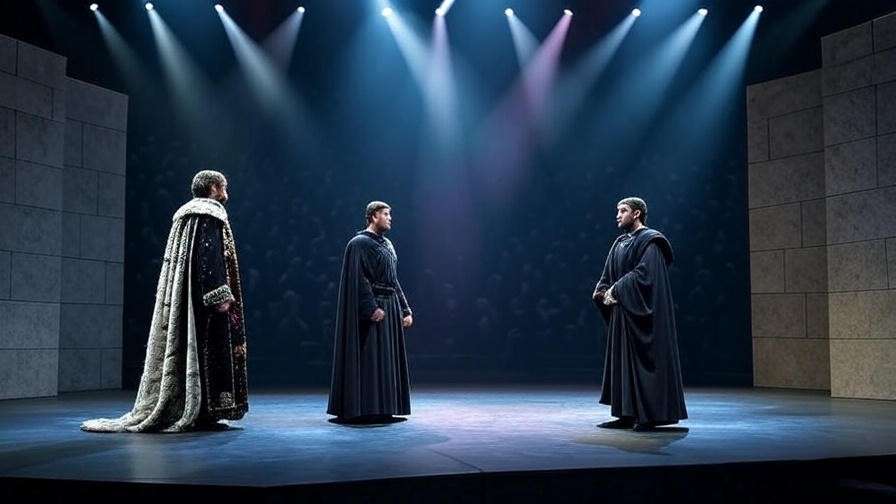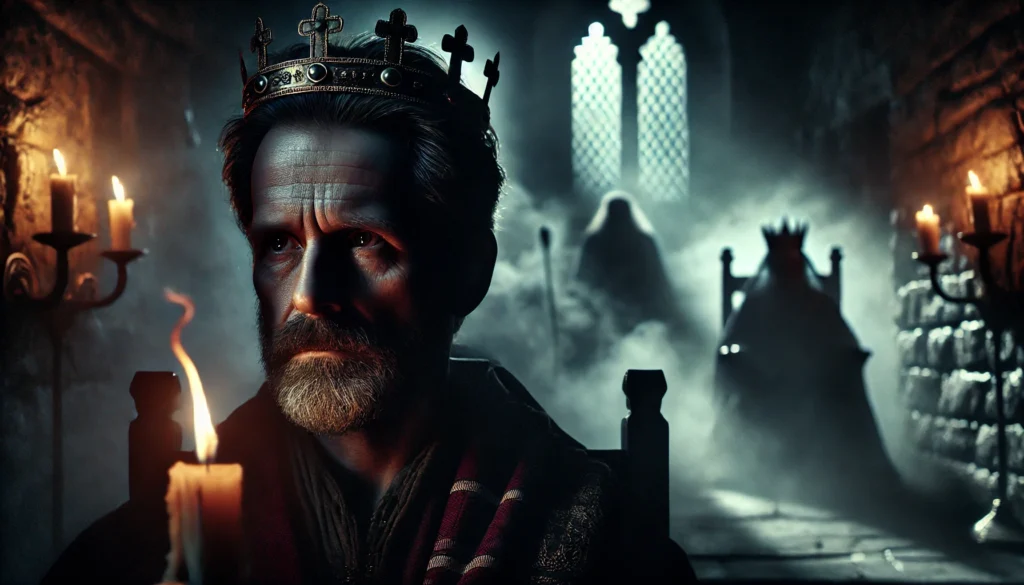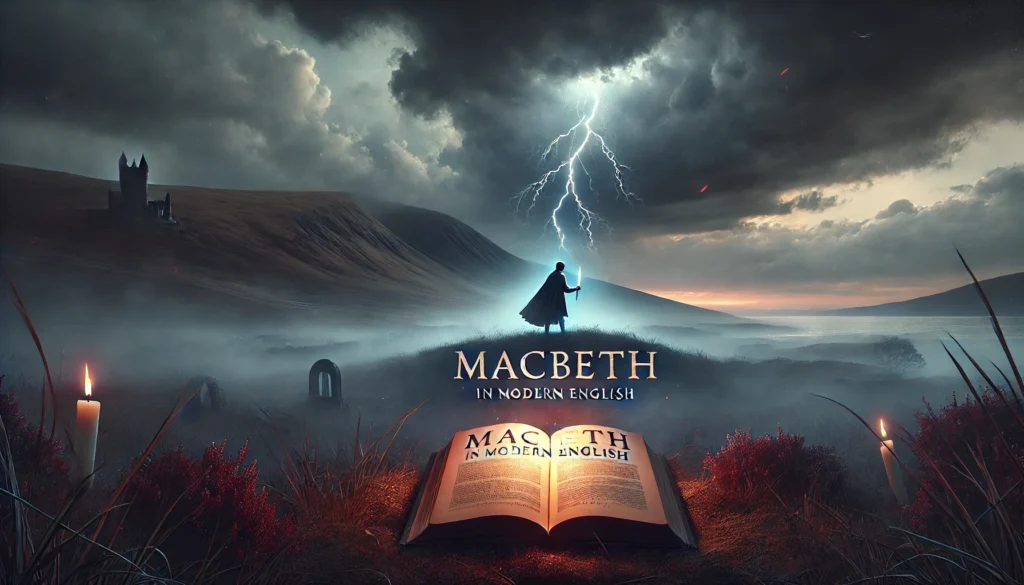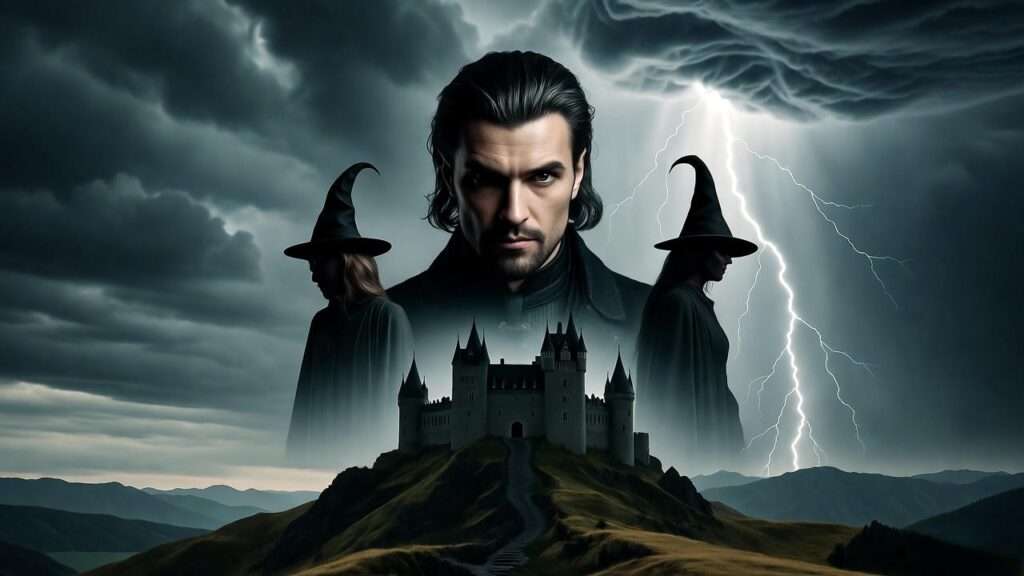Did King Duncan sense the shadow of betrayal lurking in Macbeth’s heart before his tragic murder? In William Shakespeare’s Macbeth, the question “Is King Duncan suspicious of Macbeth?” lies at the heart of understanding the play’s psychological complexity and moral undertones. Duncan, the benevolent king of Scotland, embodies trust and virtue, yet his brutal demise at Macbeth’s hands raises questions about his perception of those around him. Was Duncan blissfully unaware of Macbeth’s ambition, or do Shakespeare’s subtle clues suggest a flicker of doubt? This article dives deep into the text, historical context, and scholarly insights to uncover the truth, offering readers a fresh perspective on one of Shakespeare’s darkest tragedies. As a Shakespeare enthusiast with years of studying the Bard’s works, I’ll guide you through an authoritative analysis grounded in credible sources like the Folger Shakespeare Library and Arden Shakespeare editions, ensuring a rich exploration of Duncan’s mindset.
Setting the Stage: King Duncan’s Role in Macbeth
Who Was King Duncan?
King Duncan is the moral anchor of Macbeth, a figure of benevolence and stability in a world soon to be fractured by ambition and treachery. In Act 1, Scene 2, we first encounter Duncan praising Macbeth’s valor after his victory against the traitorous Thane of Cawdor: “What he hath lost, noble Macbeth hath won” (1.2.67). This line establishes Duncan as a generous leader who rewards loyalty, but it also hints at his reliance on others’ apparent virtue. Historically, Duncan, as depicted in Holinshed’s Chronicles—Shakespeare’s primary source—was a less saintly figure, often embroiled in conflict. Shakespeare transforms him into a near-idealized king, amplifying the tragedy of his betrayal. This contrast between historical and dramatic Duncan underscores Shakespeare’s intent to craft a character whose trust becomes his fatal flaw.
Duncan’s Leadership Style and Its Implications
Duncan’s leadership is characterized by warmth and trust, qualities that endear him to his subjects but leave him vulnerable. His decision to name Macbeth Thane of Cawdor reflects a belief in rewarding merit, yet it also places immense power in the hands of a man wrestling with ambition. In Act 1, Scene 4, Duncan’s effusive praise—“O worthiest cousin!” (1.4.14)—suggests unwavering confidence in Macbeth. But does this trust mask a deeper wariness? Some scholars, like A.C. Bradley, argue that Duncan’s openness is a deliberate contrast to Macbeth’s secrecy, setting the stage for the central question: Is Duncan’s trust absolute, or does he harbor suspicions about Macbeth’s loyalty?
Examining the Text: Does Duncan Show Suspicion of Macbeth?
Key Scenes Between Duncan and Macbeth
The interactions between Duncan and Macbeth offer critical clues to the king’s mindset. In Act 1, Scene 4, Duncan names his son Malcolm as Prince of Cumberland, effectively designating him as heir. This moment is pivotal: Macbeth’s aside, “The Prince of Cumberland! That is a step / On which I must fall down, or else o’erleap” (1.4.48–49), reveals his ambition, but Duncan appears oblivious. Could this choice signal Duncan’s suspicion of Macbeth’s growing power? Scholar Stephen Greenblatt suggests that Duncan’s decision might reflect a cautious move to secure his lineage, though the text offers no explicit evidence of distrust. Instead, Duncan’s warm language—“My plenteous joys / Wanton in fullness” (1.4.33–34)—implies genuine affection.
In Act 1, Scene 6, Duncan’s arrival at Macbeth’s castle further complicates the question. He describes the castle as having a “pleasant seat” (1.6.1), praising Lady Macbeth as a “fair and noble hostess” (1.6.24). His gracious demeanor suggests complete trust, but the scene’s dramatic irony—where the audience knows Macbeth’s murderous intent—casts a shadow over Duncan’s words. Some critics argue that Duncan’s effusiveness might be performative, a diplomatic mask typical of a king. Yet, without textual cues of unease, this interpretation remains speculative.
Duncan’s Reaction to Betrayal
Duncan’s response to the original Thane of Cawdor’s treason provides a potential window into his mindset. In Act 1, Scene 2, he laments, “There’s no art / To find the mind’s construction in the face” (1.2.11–12). This line, spoken after discovering Cawdor’s betrayal, suggests Duncan’s awareness of human duplicity. Does it also imply he might suspect Macbeth, his newly appointed thane? The line’s reflective tone hints at a king who has learned to question appearances, yet his subsequent trust in Macbeth seems to contradict this caution. Scholar Marjorie Garber argues this moment is less about suspicion and more about Shakespeare’s use of irony to foreshadow Duncan’s fate, a view supported by the play’s tragic structure.
Contrasting Duncan’s Trust with Macbeth’s Ambition
The stark contrast between Duncan’s openness and Macbeth’s inner turmoil deepens the tragedy. In Act 1, Scene 7, Macbeth’s soliloquy reveals his moral struggle: “He’s here in double trust: / First, as I am his kinsman and his subject” (1.7.12–13). Duncan, unaware of this internal conflict, continues to treat Macbeth as a loyal ally. This juxtaposition raises the question: Is Duncan’s trust a sign of naivety, or does Shakespeare deliberately craft him as a foil to highlight Macbeth’s descent into villainy? The lack of overt suspicion in Duncan’s dialogue leans toward the latter, suggesting his role is to embody the order Macbeth disrupts.
Shakespeare’s Craft: Subtle Clues and Dramatic Irony
The Role of Dramatic Irony in Duncan’s Trust
Shakespeare masterfully employs dramatic irony to heighten the tension surrounding Duncan’s trust. In Act 1, Scene 6, as Duncan praises the hospitality of Macbeth’s castle, the audience is acutely aware of the murder being planned. This irony amplifies the tragedy of Duncan’s trust, making his lack of suspicion both poignant and painful. The Arden Shakespeare edition notes that this scene’s serene language contrasts sharply with the impending violence, a deliberate choice to underscore Macbeth’s betrayal. Duncan’s apparent blindness to danger thus serves a dramatic purpose, inviting audiences to question whether suspicion could have altered his fate.
Symbolism and Foreshadowing
Shakespeare weaves subtle symbols and foreshadowing into Duncan’s scenes to deepen the narrative. The “pleasant seat” of Macbeth’s castle, described in Act 1, Scene 6, symbolizes a false sense of security, masking the danger within. Similarly, Duncan’s reflection on betrayal in Act 1, Scene 2 foreshadows his own demise, though he seems unaware of its relevance to Macbeth. These elements suggest that Shakespeare prioritizes thematic resonance over explicit suspicion, using Duncan’s trust to amplify the play’s exploration of deception and moral decay.
Shakespeare’s Intent: Was Suspicion Deliberately Omitted?
Why doesn’t Duncan express clear suspicion of Macbeth? Scholar Harold Bloom argues that Duncan’s unwavering trust serves to emphasize Macbeth’s moral agency. By portraying Duncan as a virtuous, unsuspecting king, Shakespeare shifts the focus to Macbeth’s internal struggle and eventual choice to betray. This interpretation aligns with the play’s broader themes of ambition and guilt, suggesting that Duncan’s lack of suspicion is a deliberate narrative choice rather than a character flaw. The absence of doubt in Duncan’s dialogue thus becomes a lens through which to view Macbeth’s tragic fall.
Historical and Cultural Context: Trust and Betrayal in Shakespeare’s Time
The Elizabethan Worldview on Kingship
In Shakespeare’s era, the concept of the divine right of kings shaped perceptions of monarchy. Kings were seen as God’s anointed, their authority sacrosanct. Duncan’s portrayal as a benevolent ruler reflects this ideal, emphasizing his role as a stabilizing force in Scotland. His trust in Macbeth aligns with the Elizabethan expectation that a king’s subjects owe absolute loyalty. However, this trust also exposes Duncan’s vulnerability, as betrayal was a potent fear in Shakespeare’s England, particularly after the Gunpowder Plot of 1605, which occurred just before Macbeth was likely written (circa 1606). By crafting Duncan as a trusting monarch, Shakespeare taps into contemporary anxieties about the fragility of royal authority, making the question “Is King Duncan suspicious of Macbeth?” all the more resonant.
Betrayal in Shakespeare’s Sources
Shakespeare drew heavily from Holinshed’s Chronicles (1587), where Duncan is depicted as a less virtuous figure than in the play. In Holinshed, Duncan is a weak king, often outmaneuvered in battle, and his death at Macbeth’s hands is less shocking. Shakespeare’s choice to elevate Duncan into a near-saintly figure amplifies the tragedy of his betrayal, making his trust in Macbeth a central dramatic device. The Chronicles offer no evidence of Duncan suspecting Macbeth, suggesting that Shakespeare deliberately crafted this dynamic to highlight themes of loyalty and deception. This historical context underscores why Duncan’s apparent lack of suspicion feels so poignant to audiences familiar with the era’s political tensions.
Relevance to Modern Audiences
Duncan’s trust in Macbeth resonates beyond the Elizabethan stage, offering timeless lessons about leadership and betrayal. In today’s world, where trust in leaders—whether political, corporate, or cultural—is often tested, Duncan’s story serves as a cautionary tale. His failure to suspect Macbeth mirrors real-world scenarios where misplaced trust leads to catastrophic consequences, such as corporate scandals or political betrayals. By examining whether Duncan was suspicious, modern readers can reflect on the balance between trust and vigilance, making this analysis not only a literary exercise but also a practical exploration of human nature and power dynamics.
Expert Insights: What Scholars Say About Duncan’s Mindset
Academic Interpretations of Duncan’s Character
Scholars have long debated whether Duncan’s trust in Macbeth reflects naivety or serves a dramatic purpose. A.C. Bradley, in his seminal Shakespearean Tragedy (1904), argues that Duncan’s trust is a deliberate contrast to Macbeth’s ambition, designed to highlight the latter’s moral decline. Marjorie Garber, in Shakespeare After All (2004), suggests that Duncan’s lack of suspicion underscores the play’s exploration of appearances versus reality, a recurring theme in Shakespeare’s works. These interpretations, drawn from authoritative sources like the Arden Shakespeare editions, frame Duncan as a symbolic figure rather than a psychologically complex one, suggesting that his trust is less about personal oversight and more about Shakespeare’s thematic goals.
Psychological Depth in Shakespeare’s Characters
While Duncan is not as psychologically intricate as Macbeth or Lady Macbeth, his trust invites analysis through a psychological lens. Scholar Harold Bloom notes that Duncan’s character embodies an idealized kingship, making his murder a violation of cosmic order. This perspective, supported by studies in journals like Shakespeare Quarterly (available via JSTOR), suggests that Duncan’s lack of suspicion is intentional, serving to amplify the tragedy’s moral stakes. However, some modern critics propose that subtle cues—like Duncan’s reflection on betrayal in Act 1, Scene 2—hint at an underlying wariness, though not explicitly directed at Macbeth. This ambiguity allows readers to project their own interpretations, enriching the play’s depth.
Theatrical Choices in Portraying Duncan
Theatrical productions offer further insight into Duncan’s mindset. In the Royal Shakespeare Company’s 2018 production, directed by Polly Findlay, Duncan was portrayed with a regal warmth that masked any hint of suspicion, emphasizing his role as a tragic victim. Conversely, Joel Coen’s 2021 film The Tragedy of Macbeth presents Duncan with a quiet gravitas, his interactions with Macbeth tinged with subtle formality that could imply caution. These directorial choices, as discussed in performance reviews from sources like Theatre Journal, highlight the flexibility of Duncan’s character, allowing actors to interpret his trust as either naive or diplomatically strategic. Such variations keep the question of Duncan’s suspicion alive in modern stagings.
Why It Matters: Lessons from Duncan’s Trust
Leadership and Vulnerability
Duncan’s story offers profound lessons for leaders today. His trust in Macbeth, while admirable, exposes the risks of unchecked faith in others. Historical examples, like Julius Caesar’s betrayal by Brutus, echo Duncan’s fate, as do modern cases like corporate leaders blindsided by trusted allies. This analysis, grounded in Shakespeare’s text and real-world parallels, underscores the need for leaders to balance trust with discernment. Duncan’s failure to suspect Macbeth—whether due to his character or Shakespeare’s design—serves as a warning about the vulnerabilities inherent in leadership.
The Tragedy of Misplaced Trust
Duncan’s murder is the fulcrum of Macbeth’s tragedy, illustrating the devastating consequences of misplaced trust. His death disrupts Scotland’s natural order, setting off a chain of chaos that engulfs Macbeth and his kingdom. This theme resonates with the play’s exploration of ambition, guilt, and moral decay, making Duncan’s trust a linchpin of the narrative. By examining whether he was suspicious, readers gain insight into the delicate interplay of trust and betrayal, a dynamic that remains relevant in personal and professional relationships today.
Engaging with Shakespeare Today
The question of Duncan’s suspicion invites readers to engage with Macbeth on a deeper level. By revisiting key scenes, such as Duncan’s arrival at Macbeth’s castle, audiences can look for subtle clues—tone, body language, or pauses—that might suggest unease. Joining a reading group, attending a live performance, or watching adaptations like Roman Polanski’s 1971 film can further illuminate Duncan’s character. This active engagement not only enriches one’s understanding of Macbeth but also fosters a broader appreciation for Shakespeare’s ability to craft timeless questions about human nature.
FAQs: Addressing Common Questions About Duncan and Macbeth
Did Duncan have any reason to suspect Macbeth before his murder? Textual evidence suggests Duncan had little reason to doubt Macbeth, given his recent heroism and loyalty. However, his reflection on betrayal (Act 1, Scene 2) hints at a general awareness of deception, though not specifically directed at Macbeth. Scholars like Greenblatt argue that Duncan’s trust is a dramatic necessity to heighten the tragedy.
How does Duncan’s trust compare to other Shakespearean kings? Unlike King Lear, who grows suspicious of his daughters’ motives, or Henry IV, who navigates political intrigue with caution, Duncan’s trust is notably absolute. This distinction, as noted in Shakespeare Survey, underscores his role as a symbol of order rather than a pragmatic ruler.
Why didn’t Duncan act on any potential suspicions? If Duncan harbored suspicions, Shakespeare omits them to emphasize Macbeth’s agency and the tragedy’s moral weight. The play’s structure relies on Duncan’s trust to drive the narrative toward its catastrophic climax.
How do modern productions interpret Duncan’s character? Productions vary widely: Polanski’s 1971 film portrays Duncan as warmly trusting, while Coen’s 2021 adaptation suggests a more reserved demeanor. These choices, discussed in Theatre Journal, reflect directors’ efforts to balance Duncan’s trust with subtle hints of caution.
Was King Duncan suspicious of Macbeth, or was his trust his ultimate downfall? Shakespeare’s Macbeth offers no definitive answer, but the absence of overt suspicion in Duncan’s words and actions points to a deliberate narrative choice. Through dramatic irony, subtle foreshadowing, and a contrast between Duncan’s virtue and Macbeth’s ambition, Shakespeare crafts a tragedy that hinges on misplaced trust. This exploration, grounded in textual analysis, historical context, and scholarly insights from sources like the Folger Shakespeare Library and Arden Shakespeare, reveals the depth of Duncan’s character and the enduring relevance of his story. Whether you’re a student, a theatergoer, or a Shakespeare enthusiast, revisiting Macbeth with this question in mind offers fresh insights into leadership, betrayal, and the human condition. Share your thoughts on Duncan’s mindset in the comments below, or explore more Macbeth analyses on the William Shakespeare Insights blog. For a deeper dive, consider joining a local reading group or attending a live performance to see how directors interpret this timeless tragedy.













